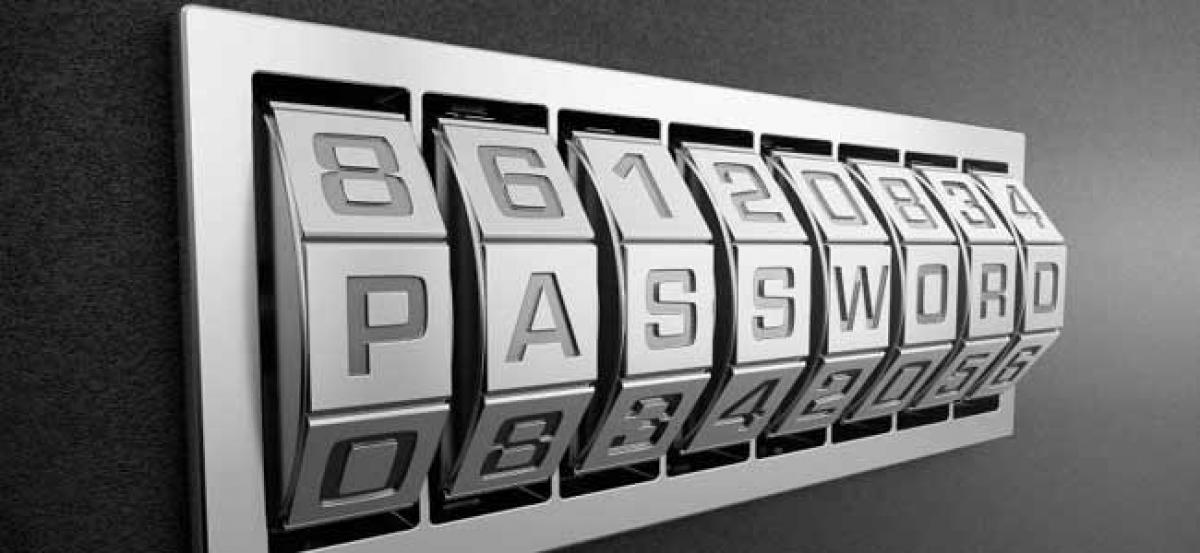Live
- Keerthy Suresh in sultry avatar for Bollywood debut ‘Baby John’
- Ram Charan pre-look for ‘RC16’ sets internet on fire
- BBMP Accused Of Misappropriating ₹46,300 Crore In Public Funds
- Tensions Mount In Manipur As Missing Meitei Man Sparks Protests
- Allahabad High Court To Review Dual Citizenship Allegations Against Rahul Gandhi
- Tollywood mourns the loss of lyricist Kulasekhar
- Labourer's Mortal Remains Negligently Disposed Four Arrests Made Thus Far
- How Businesses Can Encourage Innovation And Collaboration In Diverse Workforce
- City Teenager Recovers from Rare Rickettsial Meningoencephalitis
- WHO-IARC twisted data -CAMPCO chief
Just In

Is it exhausting for you to come up with a new password every time you make a new account somewhere Well, it turns out that the alltoocommon practice of using the same email addresspassword combination to log into multiple websites can be damaging
Is it exhausting for you to come up with a new password every time you make a new account somewhere? Well, it turns out that the all-too-common practice of using the same email address/password combination to log into multiple websites can be damaging.
According to a recent study, the practice can cause more harm to the employers with many users and valuable assets protected by passwords, like in universities. "If someone uses their university email address and passphrase to sign up for, say, LinkedIn, and LinkedIn is breached by cybercriminals, that would mean their university password is sitting on the web for everyone to see," said Indiana University's Dan Calarco, co-author of the study.
"We found that requiring longer and more complicated passwords resulted in a lower likelihood of password reuse," the authors write in the paper, Factors Influencing Password Reuse: A Case Study. The authors are Jacob Abbott, an IU Bloomington PhD student; Daniel Calarco, chief of staff for the IU Office of the Vice President for IT and CIO; and L. Jean Camp, a professor in the IU Bloomington School of Informatics, Computing and Engineering.
The group presented their findings at the TPRC46: Research Conference on Communications, Information and Internet Policy in Washington, D.C. To investigate the impact of policy on password reuse, the study analyzed password policies from 22 different US universities, including their home institution, IU. Next, they extracted sets of emails and passwords from two large data sets that were published online and contained over 1.3 billion email addresses and password combinations. Based on email addresses belonging to a university's domain, passwords were compiled and compared against a university's official password policy.
The study found that stringent password rules significantly lower a university's risk of personal data breaches. "Our paper shows that passphrase requirements such as a 15-character minimum length deter the vast majority of IU users (99.98 per cent) from reusing passwords or passphrases on other sites," they write. "Other universities with fewer password requirements had reuse rates potentially as high as 40 per cent." Their analysis found that IU performed the best of all 22 universities — and had the most extensive requirements.
The authors could not legally test whether credentials were actually valid; instead, they examined whether passwords could potentially be valid given public password requirements such as password length, complexity and other requirements. "IU has worked with security and usability faculty to design our password policies, with the result being policies that value people's time while mitigating risk," Camp said. "The length and complexity are balanced by the extended period before new passwords must be generated and the use of a longer authentication time window for applications. Indiana University's rollout of two-factor authentication is similarly a model."
The authors offer the following recommendations to safeguard passwords: Increase the minimum password length beyond 8 characters. Increase the maximum password length. Disallow the user's name or username inside passwords. Contemplate multi-factor authentication. Multi-factor authentication is becoming more common and usable. IU, for example, employs Two-Step Login. With the potential benefits of reducing the risk of password reuse, multi-factor authentication may be a viable alternative to changing the length and/or complexity of password policies. "Our recommendations are not only applicable for universities but also can be used by other organisations, services or applications," they write.

© 2024 Hyderabad Media House Limited/The Hans India. All rights reserved. Powered by hocalwire.com







